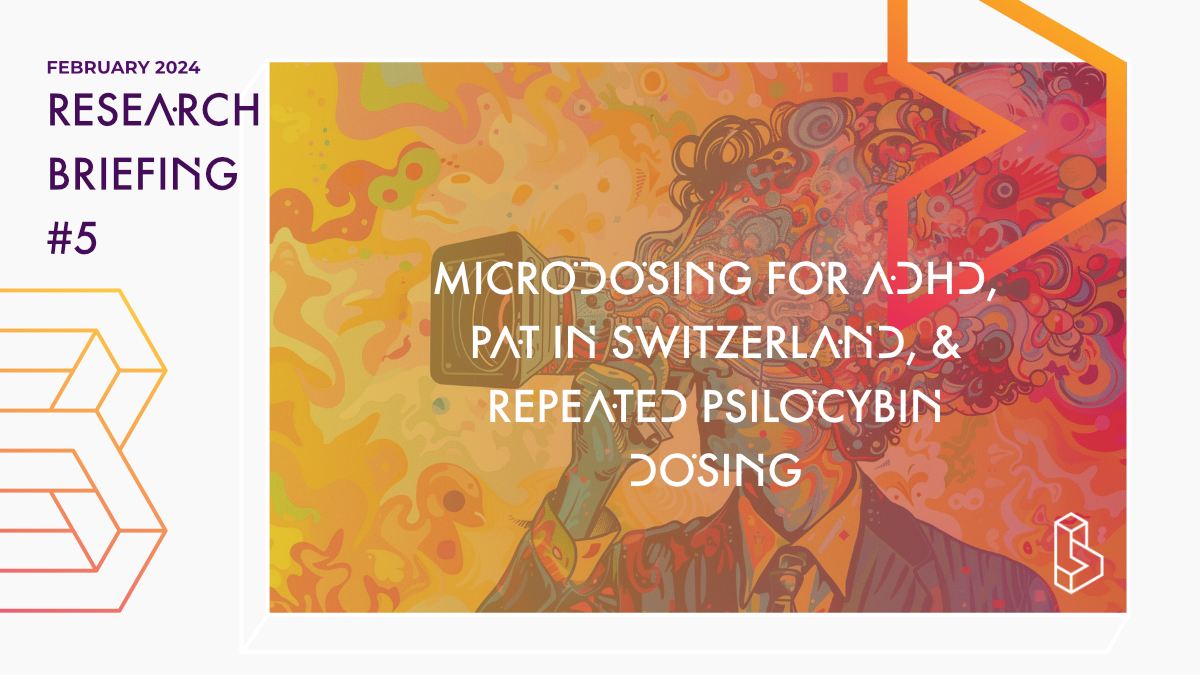Blossom’s weekly recap and analysis of three of the latest psychedelic papers published last week.
How can microdosing support people who experience ADHD, and does it work better than conventional medications? The first article explores this across two studies. We then venture into the heart of Europe, where psychedelic-assisted psychotherapy has been legally possible for the last decade (again). Finally, I’ll focus on the flexible repeated dosing in a trial with psilocybin for depression.
What are the Risks of Microdosing Psychedelics?
ADHD is usually managed through a variety of treatments involving medication, education, skills training and psychological counselling. Researchers from the University of Maastricht pondered the question if psychedelics could also be part of this mix. Earlier research showed that people with mental & physical health problems self-rated the effectiveness of microdosing as higher than conventional treatments in regards to ADHD/ADD and anxiety.
Can we still see these effects if we measure participants over a more extended period (through a prospective survey)? A recent study led by Haijen, Hurks, and Kuypers delves deep into the effects of psychedelic microdosing on adults with severe ADHD symptoms, contrasting its impacts with those of conventional ADHD medication.
The researchers embarked on a two-part investigation, initially exploring the terrain without a control group, where participants (n=233) reported improvements in emotional regulation and aspects of empathy after four weeks of self-initiated microdosing. Noteworthy is the inclusion of cognitive reappraisal and expressive suppression as markers of emotional regulation, alongside perspective-taking and personal distress for empathy. However, the absence of a control group in the first study left room for scepticism, prompting a more rigorous second study with a control group comparing microdosing effects directly against conventional ADHD medication.
The follow-up study narrows down to a subset from the initial group against a control group of conventional medication users, presenting a nuanced view of microdosing’s efficacy. After four weeks, those in the microdosing cohort showed notable reductions in ADHD symptoms compared to their counterparts on traditional medication routes. However, the initial gains in cognitive reappraisal and empathy observed were not sustained when controlled for, leaving expressive suppression as the lone survivor showcasing prolonged improvement.
This juxtaposition of microdosing’s impact on ADHD symptoms, emotion regulation, and empathy provides a compelling narrative. It suggests that while microdosing may offer a viable alternative to conventional medication for symptom management, its benefits on broader emotional and social processing require further exploration.
The study’s methodological design, leveraging a naturalistic prospective approach, enriches the authenticity of its findings. However, it also underscores the complexity of microdosing’s effects, hinting at its nuanced interaction with the brain’s serotonergic system, potentially modulating emotional regulation through the 5-HT2A receptor.
Supporting this study, earlier research with the same participants focussed on trait mindfulness and personality characteristics underscores the transformative potential of microdosing. It highlights increased mindfulness and decreased neuroticism post-microdosing, suggesting that these psychedelic substances may indeed have the power to alter stable traits over time.
Moreover, a third study with this microdosing group reinforces the narrative of microdosing’s positive impact on well-being and ADHD symptom management, further solidifying its standing as a promising alternative therapeutic pathway.
The nuanced findings from recent research illuminate a pathway where psychedelic microdosing not only presents a novel approach to managing ADHD but does so with a relatively modest yet comparable efficacy to traditional medication. This comparative subtlety, in effect, underscores an important narrative in the quest for alternative ADHD therapies. While microdosing may not dramatically outperform conventional treatments in terms of sheer symptom relief, its allure lies in the potential for fewer side effects, a common concern among those utilizing standard ADHD medications.
Lessons from Ten Years of Psychedelic-Assisted Psychotherapy in Switzerland
Become a psychedelic insider
Get a Pro Membership to enjoy these benefits & support Blossom📈 full reports on Topics & Compounds
🧵 full summary reviews of research papers
🚀 full access to new articles
See Memberships

